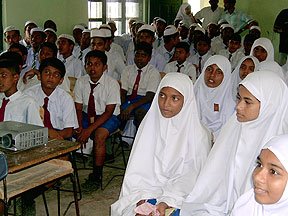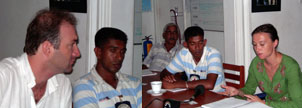Solid Waste Management Awareness Programme for School Children

The Canadian Agro-Sustainability Partnership (CASP), together with Practical Action - Ampara, is creating awareness on solid waste management among school children in the tsunami-devastated areas of Ampara District.
Meetings were held with the three zonal directors and the principals of several schools during which venues and dates for conducting the awareness programmes were arranged.
Workshops have now been conducted for students in Grade Six and above, and the first one was held at the Al-Ashrak Vidhyalayam, Nintavur, on September 8th for nearly 120 Muslim and Tamil students from three different schools in the Kalmunai Education Zone.
Two other workshops were also held for schools in Akkaraipattu and Sammanthurai zones on the 14th and 20th September respectively. More programmes of this kind are to be conducted once the Ramadan school holidays are over in Muslim schools.

Teachers, principals, zonal directors, and students alike have recognized the importance of the Solid Waste Management Awareness Programme and expressed their happiness with CASP and Practical Action's work in this area. Given the lack of focus on this subject to date, there is great interest in extending this Programme to all schools in the area.
